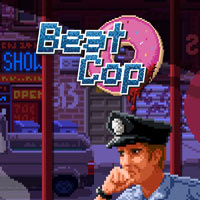Beat Cop review – everyday fun on the force
Rather quietly, overshadowed by triple-A releases, comes a game worth noticing. Beat Cop is, in some respects, quite similar to Papers, Please, but in this case, we can choose between good and bad cop.
The review is based on the PC version.
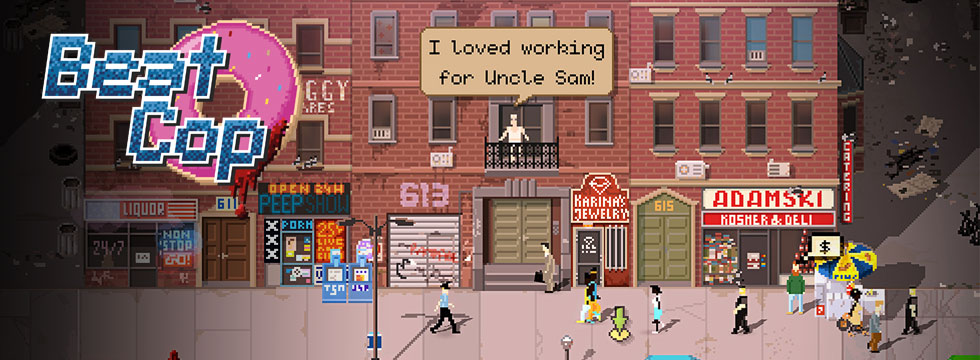
- The pixel art stylistics correspond well with the setting of the messy 1980s;
- Audacious, dark, uncompromising and very ribald humor;
- Funny, exaggerated and stereotypical characters;
- Engaging time management mechanics that constantly evoke a feeling of panic and haste;
- The ability to play a good or a very, very, very bad cop;
- Great ideas for side quests, which usually let you do anything but protect the law.
- Glitches in side quests;
- Annoying minigame in the form of searching a car’s boot;
- The premise of this game would probably work better in a bit more concise form.
There’s nothing like boys in blue! If you ever dreamed of working as a tough, no-BS cop in the times when good spaghetti and the Chicago overcoat were all the rage among Italian gangsters, and playing a boombox at the corner of the street was the best advertisement for drug dealers, then Beat Cop, coming from the Polish studio Pixel Crow, will let you live this fantasy. The young Polish team reached out for dusty cult pictures from the 70s, 80s, and 90s, such as Dirty Harry, Columbo or Miami Vice, and created a story that clearly references these hits, while smuggling in a big chunk of illegal humor.
Pixel Crow studio has definitely hit the ground running with their debut title; although the studio was only established in 2014, the founders – Maciej Miasik and Adam Kozlowski – can already boast quite a record: they’ve worked with LK Avalon, CD Projekt RED and Vivid Games. This debuting team – supported by their Polish publisher, 11 bit studios – is actually made up of big shots, and I mean big, like .44 caliber big. There’s no point beating around the bush: Beat Cop meets the expectations. It’s a very good game, and even the occasional technical shortcomings don’t spoil the final outcome.
From hero to zero
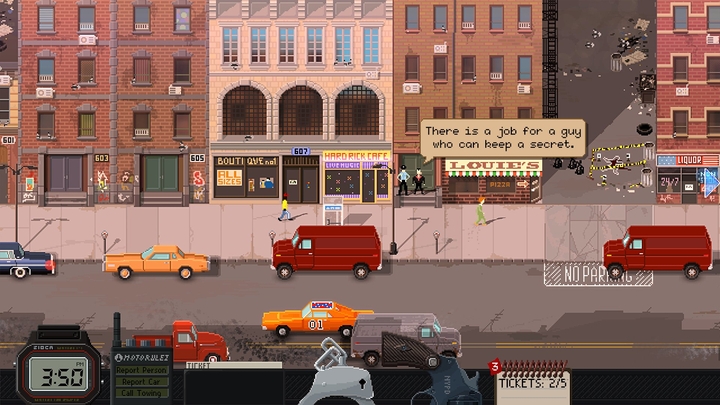
Jack Kelly was once a respected NYPD detective, but you know what they say: all good things... get stolen and end up in the local pawnshop. Framed for murder and robbery of diamonds, Kelly loses his cozy job and gets relegated to traffic patrol duty. His career ends (or perhaps begins?) in a shabby police station, where he spends his mornings being bullied by his boss and laughed at by colleagues. IRS takes interest in his pitiful salary, taking away a few hounded dollars every month for child support. To top it all off, his assignment takes him to Brooklyn, where the Italian mafia and local gangs are struggling for influence. No one believes him and nobody likes him; truth be told, he’d probably be better off if he just vanished without a word. Is there a better time to roll up your sleeves and get to work?
Especially since you only have twenty days to clear your name before some humorless men come to claim your life. The task is not easy because every day you must deal with Brooklyn itself, with its wide array of weird individuals. And the clock is ticking.
A race with time
Beat Cop is and adventure indie game, mixing the point-and-click and time management genres. The key to the player’s success, and the essential mechanism on which both Kelly’s career and life depend, is time efficiency. The gameplay was divided into days, which last ten minutes. Each one is just another day from the beat cop’s job – the player has to meet ticket quotas (the mayor’s pockets won’t fill themselves up, right?) by handing fines for parking violations, broken lights or bad tires. Patrolling the streets and answering dispatches is also part of the routine. The game offers an array of challenges: from chasing off graffiti artists and catching pickpockets to reacting to misdemeanor and investigating a couple-days-old corpses in the back alleys – the devs made sure Kelly’s working days are filled with typical duties of a policeman.
In addition to that, Kelly also has to do a lot of running to and fro in order to complete jobs and assignments given to him by superior officers (or by less-than-official employers). Every such task has its time limit – the thief will eventually run away and the suspicious car will eventually leave. Time is the ultimate enemy and in order to survive, the players have to decide which tasks to follow through, and which to ignore. Kelly often gets calls from two opposite ends of the map, and even though he’s able to move quite fast, there’s a stamina bar that regulates the amount of time he can spend sprinting. To aid his efforts and brighten his days, random pedestrians often stop him and ask for assistance with some new problem. Add to that the fact that he has to issue a certain amount of tickets everyday, and you’ll get the sense of just how stressful a job he has.
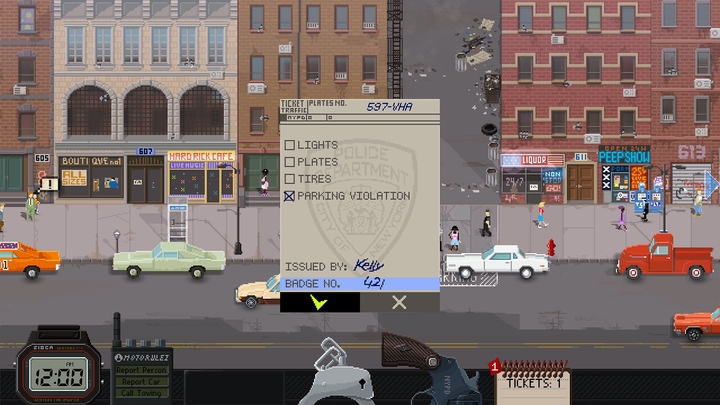
Most quests are completed by simply talking to people and then making different decisions that all influence Kelly’s reputation, and in some cases even the game’s ending. During the conversations, time stops to allow the players to focus on the text – the dialogues are a rare opportunity to catch your breath. Still, the time is running when you’re issuing tickets, checking car lights or searching cars’ boots. Each of these activities is a separate minigame. In case of the tickets, the player has to fill in a simple form, stating the reason for issuing the ticket, as well as giving their badge number and name.
I found the car-searching minigame pretty annoying – in principle, it’s similar to a sokoban puzzle. Shooting isn’t terribly exciting either, as Kelly, perhaps due to all this stress, is shaking like a jelly, so the only reasonable thing to do is to test your reflexes and attempt to shoot the suspect when the crosshair briefly happens to be aimed at their head. Notice that even checking your mission objectives in the note pad costs valuable seconds and minutes, which generates a feeling of constant pressure and haste – not succumbing to panic is the key to success. If you fail to complete a task, it means not only a lower salary, but also less respect in the ‘hood.
Can I see your papers, please

The developers listed the 2013 gem, Papers Please, as their main inspiration, and it’s clearly visible. That original indie game allowed us to play the part of a customs officer in a fictional communist country. We had to check the documents of people crossing the border, expose frauds and efficiently manage our time. Much like in Beat Cop, the simple mechanics of Papers, Please were a disguise for an interesting story with multiple endings.
Shady business
Beat Cop works best as a simulator of a corrupt, cheeky, tacky and aggressive cop, who’s as keen on grabbing a donut as he is on grabbing some dirty drug money. Kelly is completely alone while on duty; around the corner, a dealer is selling dope to school kids; a couple streets away the mafia is putting an inconvenient witness out of his misery. Nobility is just as outdated as chivalry – all that’s left are filthy streets full of lost people who are trying to make ends meet. That’s where Kelly comes in: he must make sure that certain people have enough freedom, and that freedom doesn’t attract too much unwanted attention of some other people. It would also be nice if those two groups refrained from killing each other. Sure, this means he has to turn a blind eye to a double murder from time to time, but who could hold it against him?
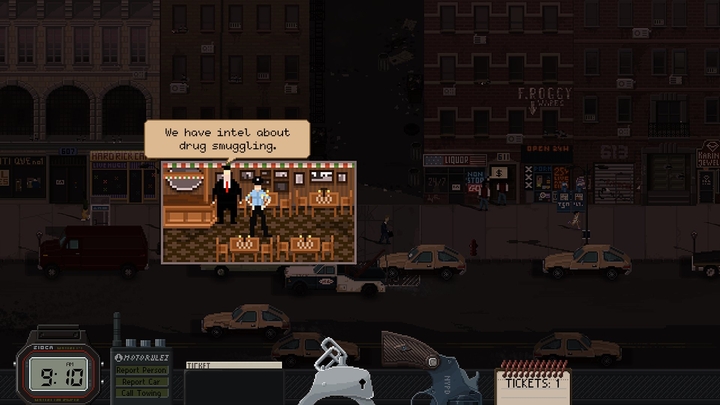
Kelly can earn respect on the streets, or do his job and stick to the pitiful salary. There are four factions that will keep an eye on his actions: the mafia, the gang, the police and regular citizens. Of course, he can’t make everyone happy. In order to survive, the former detective not only has to keep his time in check, but also use his reputation accordingly. The local priest obviously will be very happy (if you can spare “a couple” bucks…) to put in a good word for you, but that’s just the tip of the iceberg of complaints, expectations and needs that he faces.
Unfortunately, it’s not enough to be a double agent to get around. He needs to be a triple, even quadruple agent if he values his life. I’m not justifying corruption, but look at the world today; isn’t populism, conformism and opportunism better for business than firm idealism? In extreme cases, the player may see a game-over screen – that happens if Kelly isn’t able to pay his child care, loses his job or ends up with a .357 in his skull. I also liked the respect mechanics: if the amount of respect in a given faction is too low, they will stop helping Kelly complete the main thread, which may result in finishing the game with a “bad” ending.
The mafia and the gangs will interfere with the protagonist’s duties. They will also offer him many not-strictly-legal jobs – they’ve got the dough and they’re willing to cut a piece of the pie in exchange for some help. Just remember: everyone’s watching, not only the opposing faction, but the district attorney as well.
Pixel art

The pixel art stylistics have been in full bloom in the recent years, thanks to the expansion of independent video games. The retro looks are supposed to awaken nostalgia in older players, but they also symbolize pure fun and considerable difficulty level. Many games utilizing this style were successful far beyond the niche they’d aimed for, consequently infiltrating the mainstream. Titles such as FEZ, Hotline Miami, Kingdom, Papers, Please or Shovel Knight prove that a good idea reinforced with solid execution may as well mean full success.
Sex and violence
Jack Kelly is part Jimmy McNulty from The Wire, and part Harry Callahan from Dirty Harry, but you can’t deny him a sense of humor typical for crime comedies – Beat Cop is not trying to be serious for a minute. Sure, the themes this game operates on are no laughing matter: the 1986 Brooklyn is a melting pot of cultures and an arena of power struggles of different forces. The developers, however, leave it to others to tackle these issues with due gravity and instead use the setting as a means of expression rather than a background. Those are undoubtedly the 80s, only stripped down and ridiculed without mercy.
The pixel art graphics underline the scrap heap of the 1980s. Admittedly, I am a little bit tired of the abused “back to the roots” sentimentalism, but here, the enormous pixels are not just meant to squeeze one more touchy-feely tear out of you and instead, they constitute a part of the game world. I didn’t mind the stylistics one bit at any time – it was actually to the contrary: it did evoke some sentiment after all, reminding me of Hopkins FBI. The pixel art here simply works and complements the game. You soon realize that no other style would match this particular title so well.
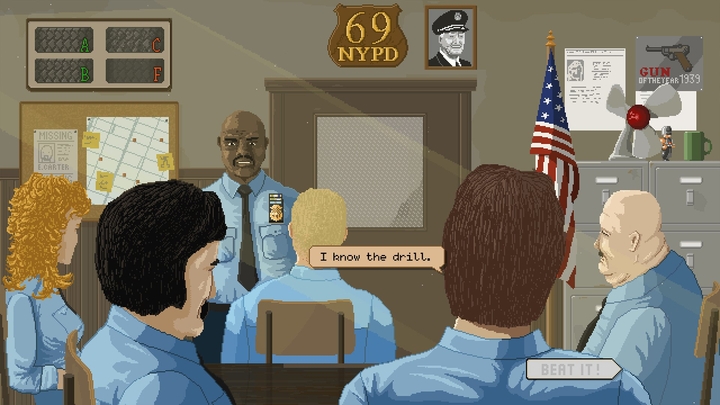
Patrolling the streets of Brooklyn in Beat Cop is like approaching a hornet’s nest and poking it with a stick. Groups of b-boys are standing at every corner; Italian gentlemen in suits are leisurely walking among them, and people blessed with unemployment populate the typical brownstones’ windows. Gaunt, homeless individuals push their shopping carts; a couple of juveniles found turned a back alley into a pub, and some guy from the third floor is spreading around his taste in music. But that’s all just background noise – entering one of the shops is where the fun begins.
Oh, the people you meet here! The Italians are running a laundry business at the corner nearby. Times are tough so they also sell drugs on the side. A few blocks further, a guy is running a sex shop, and the priest I mentioned… he’s a good guy, but has some serious addiction problems. Oh, and then there’s the donut, advertising the local cake shop, which actually is a… hell, you should see for yourself!
Each of these locations is a hyperbole of some well-known pop-culture theme, and Kelly reacts to all of them in his own, unique style – a bit crude and blunt, often offensive, but always funny. The authors are not holding themselves back at all: the humor is dark, immature, and sometimes downright raunchy. The jokes revolve around sex, sexism, homosexuality and racism; nothing’s sacred. Better don’t bring this title up if you want to advocate positive influence of video games. This is a piece of mean and boorish code, which offends everyone and does it without a hint of shame. And after making some allowances and assuming appropriate distance, you will find the game does it well.
The dark side of the uniform
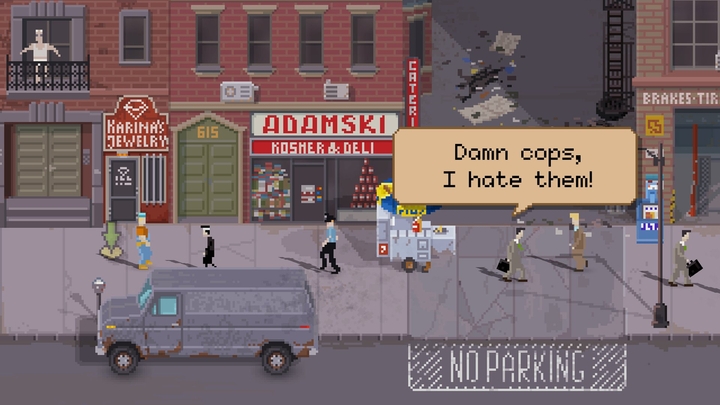
Many interesting events take place in the vibrant, albeit filthy district under Kelly’s jurisdiction. If not for those occasional happenings, I’m not sure if Beat Cop would have managed to capture my attention for long. Fortunately, the devs delivered here as well. Kelly’s schedule is filled with diverse missions, many of which I found simply hilarious. The has-been detective has to track down a cult or walk a Soviet policeman around the city as part of a cultural exchange between the USSR and the USA. He becomes, rather unexpectedly, involved in the adult movies business and drug manufacturing (in the name of the greater good), and exposes fanatic religious terrorists.
All those tasks, perhaps not very original in principle, are really well written. The dialogues are often witty, but most of the time they’re rooted in absurd. It’s hard to contain yourself and not crack a smile.
Unfortunately, the twenty days taken out from our beat cop’s career were not always exciting, and sometimes not even mildly interesting. Boredom sneaked in every now and then – issuing the hundredth parking ticket is part and parcel of a policeman’s duties, so it’s not really fair to criticize the devs for leaving in the daily toil of the job. On the other hand, I often felt that the whole game could have been a little more… concise. This would probably help avoid those rather static periods of the game, during which you’re just waiting for the following morning to come, and with it, another salty pep talk by Kelly’s supervisor.
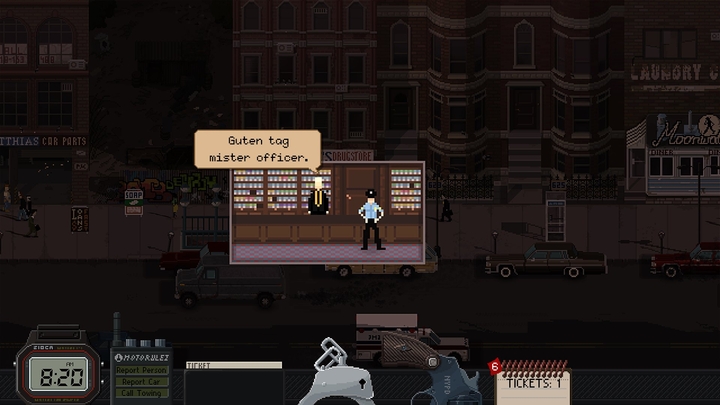
The game itself is pretty stable, but I encountered some glitches that prevented me from finishing a couple of side quests. While you could wave off repeated dispatches to an already accepted call as an element of the gameworld’s chaos, it would be hard to do so in case of quests that are assigned too late and hence actually impossible to be finished. The car searching minigame is also pretty blunt; then, there are some mechanics that weren’t used more than five times throughout the whole game (such as reporting a suspicious individual).
Another indie gem
My adventure with Beat Cop did see a happy end, after all. Getting back to the world of my childhood movies turned out to be quite pleasurable, and I would say that Pixel Crow have laid solid foundations for their future work. Some might find the language of this game quite disagreeable, and the stereotype-based world too brutal, but if presented properly and perceived through the filter of dark humor, it does its job just fine. This game is a big, fat iced donut that tastes best devoured in one bite.
ABOUT THE AUTHOR
I’ve spent around 10 hours playing Beat Cop, finishing each of the game’s 21 days, which saw me balancing between the mafia and the gangs. I finished all side quests too. I was really trying to be a good cop, but I wasn’t always successful... I wasn’t easy to bribe, though! I repeated some of these days to explore other possibilities. All in all, I spent some quality time on the streets of virtual New York. My recent experience with time management games includes Stardew Valley.
Beat Cop
Beat Cop review – everyday fun on the force
Rather quietly, overshadowed by triple-A releases, comes a game worth noticing. Beat Cop is, in some respects, quite similar to Papers, Please, but in this case, we can choose between good and bad cop.
